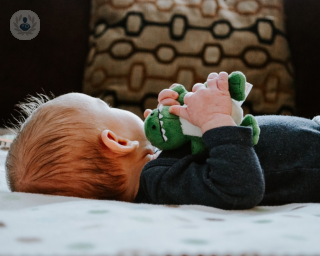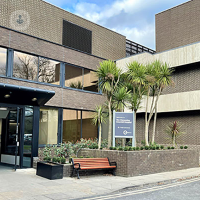Undescended testicle (Cryptorchidism)
Mr Stefano Giuliani - Paediatric surgery
Created on: 02-21-2018
Updated on: 10-19-2023
Edited by: Jay Staniland
What is cryptorchidism?
An undescended testicle, medically known as cryptorchidism, is a common condition in young male children where one of the testicles has not moved into its usual position in the scrotum. It can occur with one (unilateral cryptorchidism) or both (bilateral cryptorchidism) testes.
It is a problem that is thought to affect approximately 4% of baby boys, although in most cases the testicle(s) will descend of its own accord in the first six months after birth.
An undescended testicle may be in one of a number of places:
- Along the path of descent (in the abdomen, below the kidney, before the inguinal ring)
- In the inguinal canal (the passage above the scrotum that contains the spermatic cord)
- Outside the normal path of descent and inguinal canal – these ectopic testes have “wandered” during their descent and ended up in the wrong place, such as within the lower abdomen, under the skin of the thigh, the perineum, or even in the wrong part of the scrotum.
In some cases, a testicle may be absent altogether, a condition known as monorchism.
Cryptorchidism is usually treated by a paediatric surgeon or urologist.

Symptoms of an undescended testicle
Undescended testicles are usually diagnosed physically by the doctor. The only real symptom is the physical absence of the testicle in the scrotum. However, this physical examination can be difficult with a small baby, so the doctor may refer the child to a paediatric surgeon if concerned about possible cryptorchidism.
If the testicle cannot be located physically, the doctors may run scans, tests, or even laparoscopic (keyhole) surgery to locate it.
If the testicles haven’t descended by themselves by six months of age, they are unlikely to and treatment is usually recommended, as if they are left in the abdomen they can lead to complications, such as fertility problems later in life and increase the risk of testicular cancer.
Causes of cryptorchidism
Undescended testicles occur more frequently in premature babies. Family history of the condition is also a risk factor.
What is the treatment for cryptorchidism?
If the testicles have not descended by themselves after six months, treatment may be required.
An operation called an orchidopexy is a surgical treatment to move the undescended testicles into their correct position in the scrotum. This is usually performed in the first year of the child’s life, as the sooner it is done, the lower the risk of fertility problems and testicular cancer in later life.
















